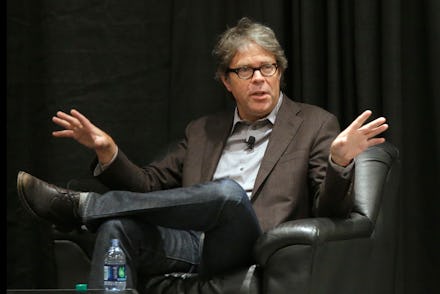Jonathan Franzen, Writer and Millionaire, Says He Is a Poor Person

Jonathan Franzen may be asking you to borrow a couple of bucks soon.
In an interview with the Financial Times, Franzen said he is a "poor person who has money."
Lucy Kellaway interviewed the writer, known for his hit novels like The Corrections, which won the National Book Award, for Financial Times' flagship series, "Lunch with the Financial Times." Franzen made the comment while disparaging New York's restaurant scene, which he described as full of 1 percenters.
Though no official figure exists, various sites quote Franzen's net worth between $5 million and $10 million. According to the Federal Reserve, the average U.S. household net worth is $85,712, making Franzen the economic equivalent of 58 U.S. households.
The average yearly income for a U.S. citizen was $26,695 in 2011 and median household income was $50,502 the same year. The federal poverty line sits as $11,700 for an individual, meaning a federally defined poor person would have to work around 427 years, while spending no money, to match Franzen's low-estimate income.
"I am literally, in terms of my income, a 1 percenter, yes," Franzen said. "I spend my time connected to the poverty that's fundamental to mankind, because I'm a fiction writer."
According to the interview, Franzen doesn't spend his money on anything extravagant, except an expensive kit for his documented bird-watching hobby. Franzen also drew the ire of the Audobon Society for a New Yorker essay he wrote on ecological conservation.
Franzen revealed he employs a Filipino worker to clean his apartment.
"I feel some justification because we pay her way more than is standard and she's a nice Filipino woman who we treat very well and we're giving her work," he said.
Franzen has proven himself rather gaffe-prone in the past several months as he circles the media to promote his new novel Purity.
In an August interview with the Guardian's Weekend magazine, Franzen recounted the six-week stint when he considered adopting an Iraqi orphan to understand young people.
"One of the things that had put me in mind of adoption was a sense of alienation from the younger generation," he told the outlet. "They seemed politically not the way they should be as young people. I thought people were supposed to be idealistic and angry. And they seemed kind of cynical and not very angry. At least not in any way that was accessible to me."
When his editor told him that was not a good idea, he instead met with recent college graduates, which he said "cured me of my anger at young people."